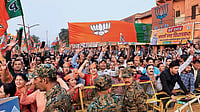As Washington and Islamabad remain engaged in a verbal duel over the Haqqani network, there are many who wonder about the kind of retaliatory action America could take against Pakistan. Could the Americans launch a ground offensive in North Waziristan? No, says analyst Dr Hassan Askari Rizvi, who believes America’s threats are more rhetorical than practical. “However, as a domestic damage control exercise, the Obama administration may order aerial bombings in North Waziristan,” Rizvi told Outlook.
Aerial bombings, Rizvi feels, could involve helicopters or fighter planes. The Pakistani air force has the capacity to shoot down choppers—and such incidents could then be blamed on the Taliban. “Fighter planes, though, would be hard for Pakistan to combat,” says Rizvi, “and I, therefore, think Pakistan would avoid a direct military confrontation with the Americans.”
Should such surgical attacks happen or there’s a spurt in drone attacks, defence analyst Dr Ayesha Siddiqa underlines the worry, “The risk with all of this is that the ghq may feel itself pressured to respond.” This is because Pakistan’s strategy till now has been to convince the Americans to negotiate with the Taliban and cite public opinion as the reason why Islamabad can’t change its policy in a way that appears to accommodate Washington. The public opinion will therefore demand that Gen Kayani and his team must respond to any attempt of the US to intensify the existing conflict.
A chain reaction will inevitably set in, goading the Americans to scale up the conflict even further. Siddiqa told Outlook, “Will a Pakistani reaction result in a higher counter-offensive by Washington? Or will there be economic sanctions against Pakistan which are bound to exacerbate the problems the country already faces? Though one hears echoes of Pakistan building up relations with China even further, there is no surety whether Beijing will agree to totally replace the US or gradually turn Pakistan into something similar to Burma, Cambodia and other Asian allies.”
Rizvi, though, thinks that Islamabad would prefer to use diplomatic channels in case of an American military intervention. The Pakistani leadership has already embarked on this course, meeting the Saudis and Chinese. “Alternately, it could suspend the NATO military supplies via Pakistan, like it did following the May 2 killing of Osama bin Laden,” says Rizvi.
Brig (retd) Aslam Ghumman, a former director-general of the Punjab chapter of the ISI, is sanguine, though. He is convinced that the Americans would never launch military action inside Pakistan as such a precipitative action would be counterprodutive. It would also widen the theatre of America’s engagement beyond Afghanistan, from where it anyway wants to cut its losses and leave.

























